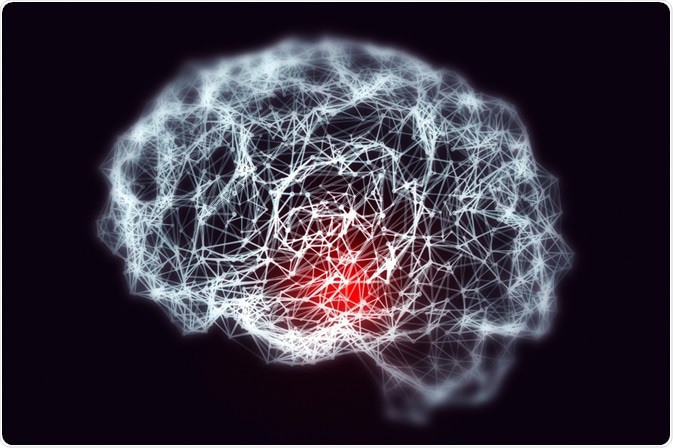It is thought that approximately 45% of adults experience some form of headache disorder globally. Research has found that such disorders may be linked to damage to brain white matter, which is also thought by some to be a risk factor of dementia. This has led to some to question whether frequent migraines can increase a person’s risk of developing dementia.
 Image Credit: Kateryna Kon / Shutterstock.com
Image Credit: Kateryna Kon / Shutterstock.com
What are migraines?
Migraines are a common health condition experienced by approximately 20% of women and 7% of men. Migraines can be characterized as a moderate or severe headache, which results in a throbbing pain in one particular part of the head. In addition to the pain felt, a range of other symptoms may be experienced, including heightened sensitivity to sound or light, nausea, and vomiting.
There are three main types of migraines: silent migraine, migraine with aura, and migraine without aura. People with migraines may experience them occasionally, or as often as multiple times per week.
What is dementia?
Dementia is one of the most prevalent neurological diseases which typically affects the elderly and is characterized by a decline in cognitive function. The symptoms experienced tend to be progressive, gradual, and persistent, and can severely impair the affected individuals’ ability to function with their daily life. The presentation of the disorder’s symptoms can often vary between patients.
For example, the decline in cognitive function can present as a plethora of symptoms, such as apraxia (the inability to continue to perform previously learned tasks), memory loss, and language and communication deficits.
There are four main types of dementia, as defined by the fifth edition of the Diagnostic and Statistical Manual of Mental Disorders: Lewy body dementia, frontotemporal dementia, vascular dementia, and Alzheimer’s disease.
Do frequent migraines increase the risk of dementia?
As dementia becomes increasingly prevalent, particularly, as most western societies are facing an aging population, there is growing concern to search for potential causes of the disease. In light of this, there is a body of research investigating the possible links between recurrent migraines and dementia. Some of the research shows that there may, indeed, be a link.
A large population-based study of patient surveys showed that those with dementia were more likely to report any type of headache (including migraines and non-migraine headaches) compared with those without dementia. Other complementary research has found that there may be a link between migraines and dementia, but only in certain populations.
For example, from the analysis of individual studies, it has been found that a history of migraines significantly increases the likelihood of developing dementia in women. Furthermore, one study showed that migraines were a risk factor for both Alzheimer’s disease and dementia. However, due to having a sample of only women migraineurs, again, this effect was only established in a female population.
In contrast to this, other researchers have found no association between frequent migraines and dementia. However, instead, some did recognize potential links more broadly between general headache disorders and dementia.
For example, researchers have identified mechanisms within the brain that are thought to overlap with both headache disorders and dementia. Studies have identified several brain structures associated with pain, including headache pain. For example, the temporal cortex, thalamus, anterior cingulate, amygdalae, and the insula have all been found to change form during the evolution of a headache. These brain areas are also associated with memory, which is typically impaired in those with dementia.
Final conclusions
It is important to note that some of the research investigating the links between migraines and the onset of dementia have identified associations, which do not necessarily mean causation. Therefore, it cannot be said whether migraines cause dementia or whether those with dementia are just more likely to experience recurrent migraines.
Furthermore, due to the contradictory nature of some of the evidence and the lack of statistically significant results, it is clear that more research is needed to clearly establish the nature of the association between frequent episodes of migraines and the onset of dementia.
Sources
Morton, R. E., St. John, P. D., & Tyas, Suzanne, L. (2019). Migraine and the risk of all-cause dementia, Alzhemier’s disease, and vascular dementia: A prospective cohort study in community-dwelling older adults. International Journal of Geriatric Psychiatry. DOI: https://doi.org/10.1002/gps.5180
Wang, J., Xu, W., Sun, S., et al. (2018). Headache disorder and the risk of dementia: a systematic review and meta-analysis of cohort studies. The Journal of Headache and Pain. DOI: https://doi.org/10.1186/s10194-018-0925-4
Rist, P. M., & Kurth, T. (2014). Migraine and cognitive decline: A topical review. Headache. DOI: 10.1111/head.12046
NHS (2019). Migraine: Overview. https://www.nhs.uk/conditions/migraine/
Duong, S., Patel, T., & Chang, F. (2017). Dementia: What pharmacists need to know. Canadian Pharmacists Journal. DOI: 10.1177/1715163517690745
Further Reading